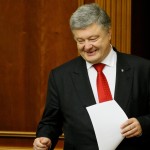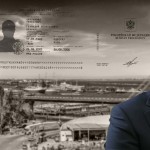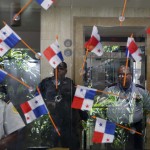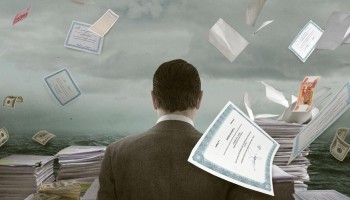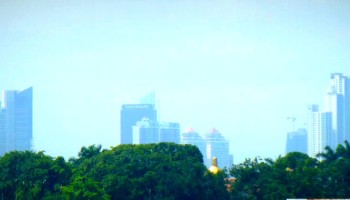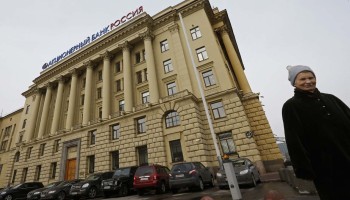On Feb. 10, 2011, an anonymous company in the British Virgin Islands named Sandalwood Continental Ltd. loaned $200 million to an equally shadowy firm based in Cyprus called Horwich Trading Ltd.
The following day, Sandalwood assigned the rights to collect payments on the loan — including interest — to Ove Financial Corp., a mysterious company in the British Virgin Islands.
For those rights, Ove paid $1.
But the money trail didn’t end there.
The same day, Ove reassigned its rights to collect on the loan to a Panama company called International Media Overseas.
It too paid $1.
In the space of 24 hours the loan had, on paper, traversed three countries, two banks and four companies, making the money all but untraceable in the process.
In 24 hours, the loan had traversed three countries, two banks and four companies.
There were plenty of reasons why the men behind the transaction might want it disguised, not least of all because the money trail came uncomfortably close to Russian leader Vladimir Putin.
St. Petersburg-based Bank Rossiya, an institution whose majority owner has been called one of Putin’s “cashiers,” established Sandalwood Continental and directed the money flow.
International Media Overseas was assigned rights to claim $200 million for just $1. IMO was controlled, on paper, by one of Putin’s oldest friends, Sergey Roldugin, a classical cellist who is godfather to Putin’s eldest daughter.
The $200 million loan was one of dozens of transactions totaling at least $2 billion found in the Mossack Fonseca files involving people or companies linked to Putin. They formed part of a Bank Rossiya enterprise that gained indirect influence over a major shareholder in Russia’s biggest truck maker and amassed secret stakes in a key Russian media property.
Suspicious payments made by Putin’s cronies may have in some cases been designed as payoffs, possibly in exchange for Russian government aid or contracts. The secret documents suggest that much of the loan money originally came from a bank in Cyprus that at the time was majority owned by the Russian state-controlled VTB Bank.
In a media conference call last week, Putin spokesman Dmitry Peskov said the government wouldn’t reply to “honey-worded queries” from ICIJ or its reporting partners, because they contain questions that “have been asked hundreds of times and answered hundreds of times.”
Peskov added that Russia has “available the full arsenal of legal means in the national and international arena to protect the honor and dignity of our president.”
Under national laws and international agreements, firms like Mossack Fonseca that help create companies and bank accounts are supposed to be on the lookout for clients who may be involved in money laundering, tax evasion or other wrongdoing. They are required to pay special attention to “politically exposed persons” — government officials or their family members or associates. If someone is a “PEP,” the middlemen creating their companies are expected to review their activities carefully to make sure they are not engaging in corruption.
Mossack Fonseca told ICIJ that it has “duly established policies and procedures to identify and handle those cases where individuals” qualify as PEPs.
Often, Mossack Fonseca appeared not to realize who its customers were. A 2015 internal audit found that the law firm knew the identities of the real owners of just 204 of 14,086 companies it had incorporated in Seychelles, a tax haven in the Indian Ocean .
British Virgin Islands authorities fined Mossack Fonseca $37,500 for violating anti-money-laundering rules because the firm incorporated a company for the son of former Egyptian President Hosni Mubarak but failed to identify the connection , even after the father and son were charged with corruption in Egypt. An internal review by the law firm concluded, “our risk assessment formula is seriously flawed .”
In all, an ICIJ analysis of the Mossack Fonseca files identified 61 family members and associates of prime ministers, presidents or kings.
The records show, for example, that the family of Azerbaijan President Ilham Aliyev used foundations and companies in Panama to hold secret stakes in gold mines and London real estate. The children of Pakistani Prime Minister Nawaz Sharif also owned London real estate through companies created by Mossack Fonseca, the law firm’s records show.
Family members of at least eight current or former members of China’s Politburo Standing Committee, the country’s main ruling body, have offshore companies arranged though Mossack Fonseca. They include President Xi’s brother-in-law, who set up two British Virgin Islands companies in 2009.
Representatives for the Azeri, Pakistani and Chinese leaders did not respond to requests for comment.
The list of world leaders who used Mossack Fonseca to set up offshore entities includes the current president of Argentina, Mauricio Macri, who was director and vice president of a Bahamas company managed by Mossack Fonseca when he was a businessman and a mayor of Argentina’s capital. A spokesman for Macri said the president never personally owned shares in the firm, which was part of his family’s business.
During the bloodiest days of Russia’s 2014 invasion of the Ukraine’s Donbas region, the documents show, representatives of Ukrainian leader Petro Poroshenko scrambled to find a copy of a home utility bill for him to complete the paperwork to create a holding company in the British Virgin Islands.
A spokesperson for Poroshenko said the creation of the company had nothing to do with “any political and military events in Ukraine.” Poroshenko’s financial advisers said the president didn't include the BVI firm in his 2014 financial disclosures because neither the holding company nor two related companies in Cyprus and the Netherlands have any assets. They said that the companies were part of a corporate restructuring to help sell Poroshenko’s confectionery business.
When Sigmundur David Gunnlaugsson became Iceland’s prime minister in 2013 he concealed a secret that could have damaged his political career. He and his wife shared ownership in an offshore company in the British Virgin Islands when he entered parliament in 2009. He sold his stake in the company months later to his wife for $1.
The company held bonds originally worth millions of dollars in three giant Icelandic banks that failed during the 2008 global financial crash, making it a creditor in their bankruptcies. Gunnlaugsson's government negotiated a deal with creditors last year without disclosing his family's financial stake in the outcome.
Gunnlaugsson has denied in recent days that his family's financial interests influenced his stances. The leaked records do not make it clear whether Gunnlaugsson’s political positions benefited or hurt the value of the bonds held through the offshore company.
In an interview with an ICIJ media partner, Reykjavik Media, Gunnlaugsson denied hiding assets. When he was confronted with the name of the offshore company linked to him — Wintris Inc. — the prime minister said “I'm starting to feel a bit strange about these questions because it's like you are accusing me of something.”
Soon after, he ended the interview.
Four days later, his wife took the matter public, posting a note on Facebook asserting that the company was hers, not his, and that she had paid all taxes on it.
Since then, members of Iceland’s parliament have questioned why Gunnlaugsson never disclosed the offshore company, with one lawmaker calling for the prime minister and his government to resign.
The prime minister has fought back, putting out an eight-page statement arguing he wasn’t required to publicly report his connection to Wintris because it was really owned by his wife and because it was “merely a holding company, not a company engaged in commercial activities.”

